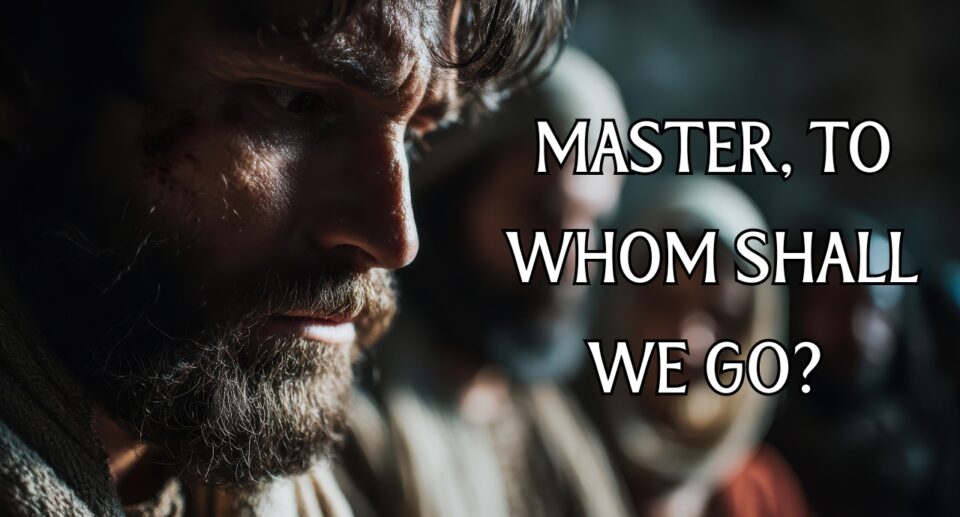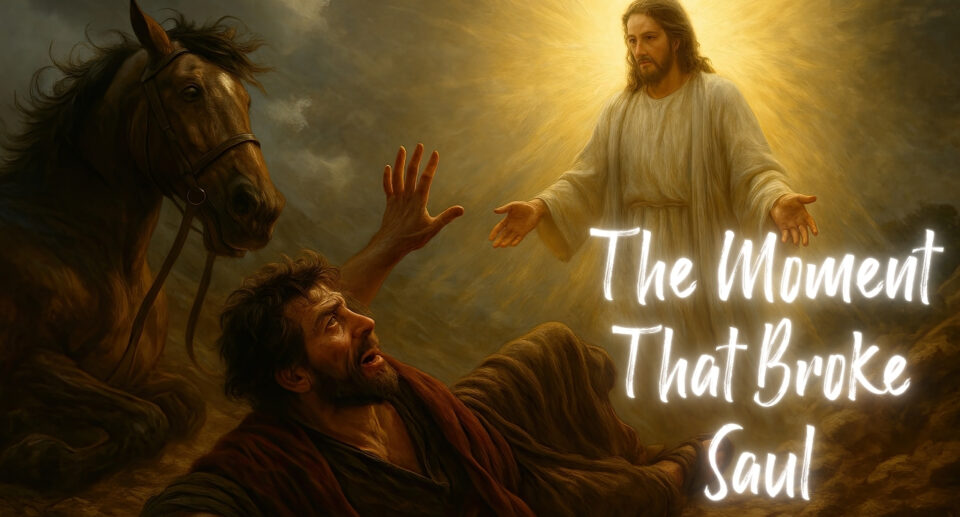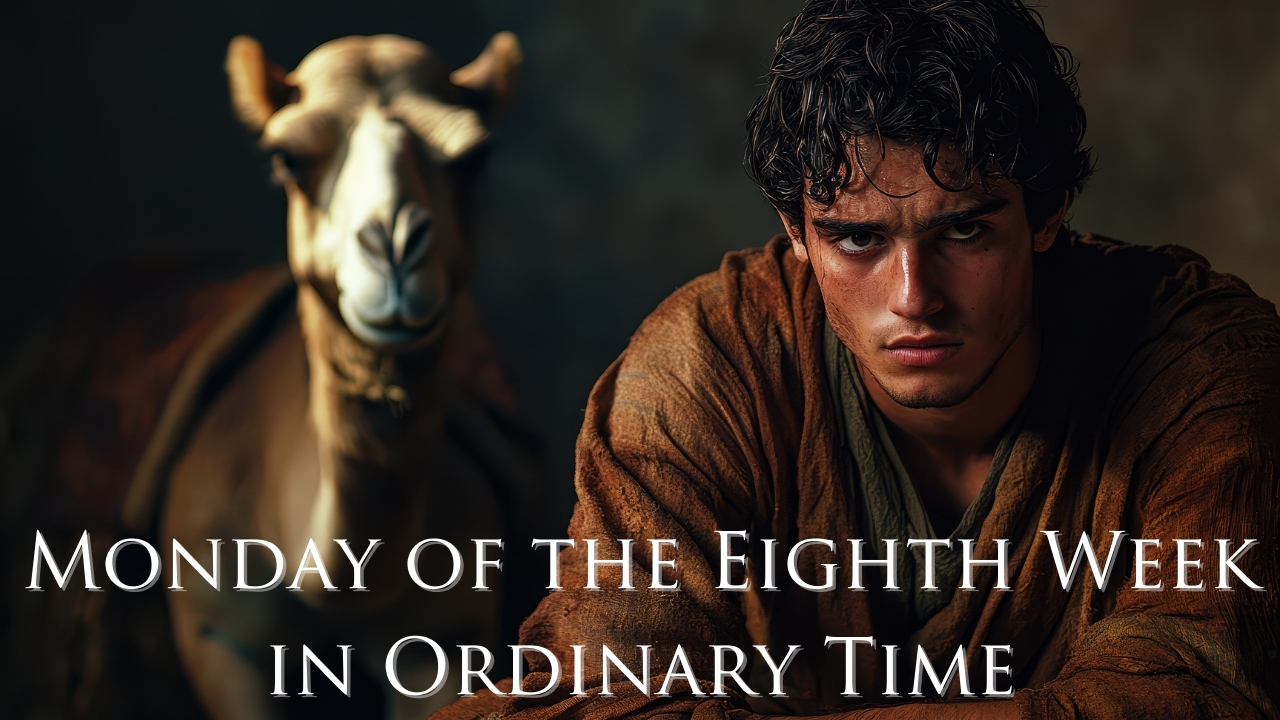Words That Give Life: Choosing to Stay When Others Walk Away | Daily Readings | May 10, 2025

May 10, 2025 – Daily Catholic Lectionary Readings for Saturday of the Third Week of Easter.
Experience the crisis moment when many disciples abandon Jesus over his “hard saying” about the bread of life. Discover how Peter’s powerful confession—”To whom shall we go?”—offers a pathway through difficulty. Witness how words spoken with divine authority bring healing and even resurrection.
Today’s reflection reveals:
- Why many followers abandoned Jesus and what enabled others to stay
- How Peter’s words to Aeneas and Tabitha demonstrate the power of life-giving speech
- What sustains faith when understanding fails
- How gratitude emerges as the natural response to divine goodness
Readings covered: Acts 9:31-42; Psalm 116:12-13, 14-15, 16-17; John 6:60-69
Perfect for anyone struggling with difficult teachings, feeling tempted to walk away from faith commitments, needing resurrection hope in seemingly impossible situations, or seeking to respond with gratitude to God’s goodness.
#CatholicDailyReadings #BibleStudy #WordsOfEternalLife #TabithaRaising #FaithDespiteDifficulty
Words That Give Life: Choosing to Stay When Others Walk Away
“This saying is hard; who can accept it?”
The disciples’ question in today’s Gospel echoes across centuries to our own hearts. When facing difficult truths or challenging teachings, do we walk away, or do we choose to stay?
Today’s readings explore a profound theme: the choice between abandonment and commitment when confronted with mystery, difficulty, or apparent impossibility. They invite us to consider what sustains faith when understanding fails.
In John’s Gospel, we witness the aftermath of Jesus’ bread of life discourse. His provocative words about eating his flesh and drinking his blood have created crisis. The text tells us, “As a result of this, many of his disciples returned to their former way of life and no longer walked with him.” This might be the most heartbreaking verse in scripture—followers who had witnessed miracles, heard teachings, and lived in community with Jesus now departing because one teaching seems too difficult.
The moment creates a decision point for the Twelve. Jesus asks them directly, “Do you also want to leave?” The question hangs in the air—honest, vulnerable, allowing genuine freedom of response.
Peter’s answer becomes one of the most powerful affirmations of faith in scripture: “Master, to whom shall we go? You have the words of eternal life. We have come to believe and are convinced that you are the Holy One of God.”
Notice what Peter doesn’t say. He doesn’t claim to fully understand Jesus’ difficult teaching. He doesn’t pretend the mystery is easy. Instead, he anchors his commitment in relationship and in the life he has experienced through Jesus’ words. When understanding fails, trust prevails.
This dynamic appears differently in our first reading from Acts. The early church enjoys a period of relative peace, “being built up and walking in the fear of the Lord, and with the consolation of the Holy Spirit it grew in numbers.” Within this context of growth, Peter travels to visit believers and performs two extraordinary acts of healing.
First, he encounters Aeneas, paralyzed and bedridden for eight years. With simple words, “Jesus Christ heals you,” Peter unleashes power that enables Aeneas to rise immediately. Then, in Joppa, he meets grieving disciples mourning Tabitha (Dorcas), known for “good deeds and charitable works.” After sending everyone out, Peter kneels in prayer, then speaks directly to the dead woman: “Tabitha, rise up.” She opens her eyes and sits up.
Both healings involve words that release power beyond natural possibility. Both result in many people coming to believe. But beneath these dramatic events lies the same question that faced the disciples in John’s Gospel: will we trust words that seem to contradict physical reality?
The paralyzed cannot simply rise. The dead do not wake at human command. Yet in both cases, the impossible becomes possible through words spoken with divine authority.
Our psalm provides the perfect response to such encounters with divine power: “How shall I make a return to the Lord for all the good he has done for me?” The psalmist, like Peter by the bedside of Tabitha, has experienced salvation from death: “Precious in the eyes of the Lord is the death of his faithful ones… you have loosed my bonds.”
The repeated refrain—”How shall I make a return?”—echoes through each of today’s readings. How do the disciples respond to difficult teachings? How do communities respond to miraculous healings? How do we respond when confronted with divine mystery?
The historical context enriches these connections. The early church faced growing opposition from both religious and political authorities. The healing of Aeneas and raising of Tabitha occur during what scholars call a “period of peace”—a brief respite from active persecution. Soon enough, followers of “the Way” would again face the choice of whether to walk away or stay faithful when threatened with consequences.
John’s Gospel was written during a time when many Jewish Christians were being expelled from synagogues, facing painful separation from family and community traditions. The departure of disciples described in today’s reading would have resonated deeply with John’s audience, who knew firsthand the cost of commitment versus the temptation to return to “former ways of life.”
Today, we face different forms of the same challenge. Contemporary culture often finds Jesus’ teachings “hard sayings” that demand too much—exclusive commitment in an age of endless options, sacrificial love in a self-focused world, belief in resurrection when scientific materialism seems more reasonable. The temptation to “return to former ways of life” remains powerful.
What enables persistence when others walk away? Peter’s answer suggests two anchors: experience and relationship. “Master, to whom shall we go? You have the words of eternal life.” He does not claim intellectual mastery but acknowledges the life he has found through Jesus’ words. His confession—”We have come to believe and are convinced”—describes a journey, not an instantaneous certainty.
The early Christians in Lydda and Joppa similarly responded to healing words with relationship—”they turned to the Lord.” Not merely intellectual assent to miracles, but personal commitment to the One whose power flowed through those events.
Our psalm articulates the natural response to such encounters with divine goodness: gratitude, commitment, and public testimony. “The cup of salvation I will take up… My vows to the Lord I will pay in the presence of all his people… To you will I offer sacrifice of thanksgiving.”
These readings invite us to examine our own response when facing difficult teachings or challenging circumstances. Do we walk away when understanding fails? Or do we, like Peter, anchor ourselves in relationship with the One whose words have given us life?
Consider how this plays out in various dimensions of experience:
Intellectually, we encounter apparent contradictions, paradoxes, and mysteries in faith that defy easy explanation. Rather than abandoning ship when full understanding proves elusive, we might follow Peter’s example—acknowledging mystery while affirming the life we’ve found through engagement with these very teachings.
Relationally, we face moments when communities disappoint, leaders fail, or fellow believers wound us. The temptation to “no longer walk with” the community becomes strong. Yet these readings remind us that our primary relationship is with the One whose words give life, not with the imperfect vessels who sometimes miscommunicate those words.
Morally, we confront ethical demands that seem impossible in contemporary culture—forgiveness of enemies, sacrifice of privilege, solidarity with the marginalized. Like Aeneas hearing “Rise up” while paralyzed, we may protest internal impossibility. Yet the same words that command also empower when received in faith.
Spiritually, we experience seasons of dryness, doubt, or apparent divine absence. When many walk away, we face the question Jesus posed to the Twelve: “Do you also want to leave?” Peter’s response becomes our lifeline: Where else would we go? Despite difficulties, we have tasted life through these words.
The raising of Tabitha offers particular hope. This woman known for “good deeds and charitable works” experienced the ultimate contradiction—death interrupting a life of service. Yet even here, words penetrate apparent finality: “Tabitha, rise up.” No circumstance, not even death itself, falls beyond the reach of words that give life.
What “hard saying” challenges you today? What circumstance seems beyond the reach of healing words? These readings invite us not to pretension of easy understanding, but to the honest confession that despite difficulties, we have found nowhere else to go. The words of Christ, however challenging, remain words of eternal life.






